Israel's Bennett Hopes Lebanon, Iraq Get Free Of Iran 'Grip'
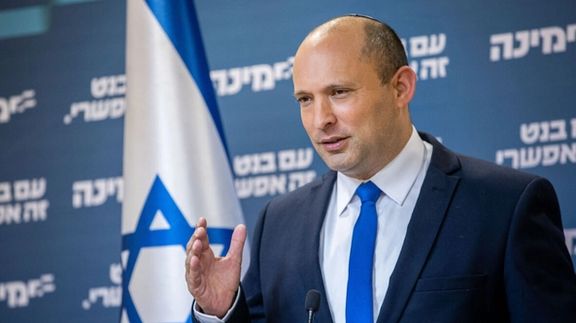
Israeli Prime Minister Naftali Bennett said Sunday he hoped Lebanon and Iraq will free themselves from Iran’s grip that has enveloped their political systems.

Israeli Prime Minister Naftali Bennett said Sunday he hoped Lebanon and Iraq will free themselves from Iran’s grip that has enveloped their political systems.
He said signs show that these countries might be "able to break free from the strangling grip of the Iranian Revolutionary Guards."
Bennett was addressing lawmakers during a weekly cabinet meeting following last week's gun battles on the streets of Beirut which killed seven people and as Iraq's Shiite militias, that often serve as a proxy for neighboring Iran, took a beating in the national election.
Israel sees "developments and trends emerging from below, of forces who simply had enough with Iranian control and influence," said Bennett.
He added that every place that Iranians enter goes into "a whirlwind of violence, poverty, instability and failure."
The confrontation in Beirut erupted when Iran-backed Hezbollah and its allu the Amla movement called for protests against a judge investigating last year’s massive port explosion. The incident raised fears of the country being drawn into further violence.
Underlying the violence are Lebanon's entrenched sectarian divides and Hezbollah’s growing influence in the past decade in the corrupt political system.
Hezbollah however has decided not to escalate the tension and said it would not be pulled into more violence.
Reporting by AP
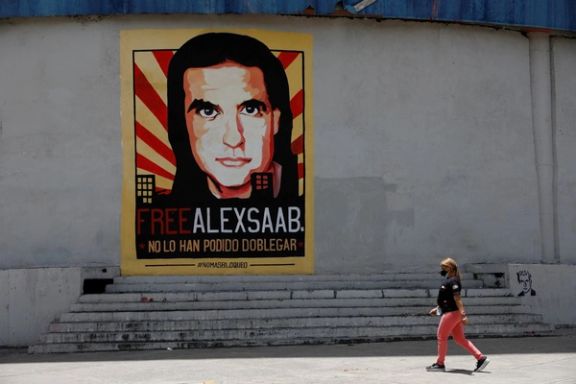
Venezuela said Saturday it would halt talks with the country's opposition in retaliation for the extradition to the US of a close ally of President Nicolás Maduro wanted on money laundering charges.
The announcement came hours after businessman Alex Saab was put on a US-bound plane in Cape Verde after failing in a 16-month fight to prevent his extradition to face money laundering charges in Miami. Saab was arrested in the African archipelago while making a stop on the way to Iran for what Maduro’s government later described as a diplomatic humanitarian mission.
US prosecutors say Saab amassed a fortune wheeling and dealing on behalf of the socialist government, which faces heavy US sanctions.
American authorities have been targeting Saab for years, believing he holds numerous secrets about how Maduro, the president's family and his top aides siphoned off millions of dollars in government contracts for food and housing amid widespread hunger in oil-rich Venezuela.
However, his defenders, including Maduro's government as well as allies Russia and Cuba, consider his arrest illegal and maintain that Saab was a diplomatic envoy of the Venezuelan.
“The government of the Bolivarian Republic of Venezuela repudiates this grave violation of human rights against a Venezuelan citizen, invested as a diplomat and representative of our country before the world,” the statement said.
Report by AP

Iran and Venezuela continue exchanging oil products despite US sanctions on both countries, without any visible action by US which tries to engage with both.
An Iran-flagged supertanker has sailed from Venezuelan waters carrying 2 million barrels of heavy crude provided by state-run oil firm PDVSA, according to documents seen by Reuters and vessel tracking services.
The shipment is part of a deal agreed by PDVSA and its counterpart National Iranian Oil Company (NIOC) that exchanges Iranian condensate for Venezuela's Merey crude. The swaps aim to ease an acute shortage of diluents that has cut Venezuela's oil output and exports, Reuters reported last month.
In August 2020. the United States confiscated four Iranian fuel shipments that had been bound for Venezuela, disrupting at the time a key supply line for both Tehran and Caracas as they defied US sanctions. In October 2020, US announced that it had sold the gasoline and refined oil.
Dino I, a very large crude carrier (VLCC) owned and operated by NIOC's National Iranian Tanker Company (NITC), finished loading the Venezuelan oil at PDVSA's Jose port late Friday, according to the documents, a source and monitoring service TankerTrackers.com.
The bilateral oil trade could be a breach of U.S. sanctions on both countries, the US Treasury Department told Reuters last month, citing government orders that establish the punitive measures.
Reuters said a Treasury spokesperson on Saturday declined to comment further on the latest development. If the US allows the shipment to proceed, it would be a change from the Trump era policy of vigorously enforcing US sanctions against Iran.
Already the vessel was allowed to reach Venezuela in September with its transponder turned off while carrying 2.1 million barrels of Iranian condensate.
A second condensate cargo of similar size is expected to be delivered to Venezuela in the coming weeks as part of the swap routine, which will be in effect for six months in its first phase.
The Biden administration has declared its opposition to Trump’s withdrawal from the 2015 nuclear deal with Iran and has entered indirect talks with Tehran to revive the agreement. So far, Washington has kept the Trump-era sanctions, as Iran has failed to reach an agreement to revive the Joint Comprehensive Plan of Actions, JCPOA.
PDVSA first launched the exchange last month by sending 1.9 million barrels of Merey heavy crude on the Iran-flagged supertanker Felicity.
The exchange provides the OPEC nation with a stable supply of blending material needed to convert its extra heavy oil into exportable grades. The pact also delivers heavy oil to Iran for blending, refining or marketing to Asian customers.
Iran and Venezuela have strengthened their cooperation in the last year even under the watchful gaze of the United States, which has in recent years reimposed sanctions on Iranian state entities, including NIOC, and in 2019 blacklisted PDVSA.
With reporting by Reuters
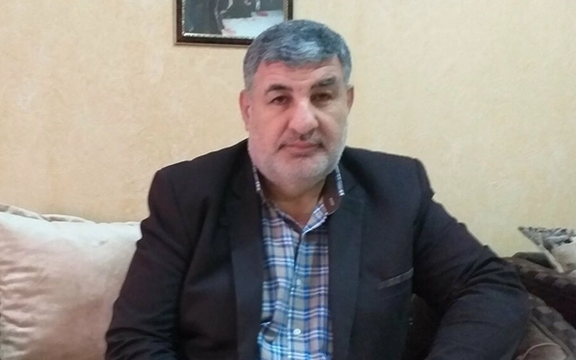
Syrian government-controlled media has blamed Israel for the assassination of Midhat as-Saleh a key intelligence asset living on the Golan Heights.
Syrian media reported Saturday evening that as-Saleh was gunned down as he was near his home in the Golan Heights overlooking Israeli territory. It is not clear if he was shot by assailants, a sniper or from an aircraft.
As-Saleh, who was originally from the Golan Heights, served many years in an Israeli prison on security charges and then fled back to Syria where he became a member of the Assad-controlled parliament. But he is said to have been a top intelligence operator that was also working with Iran in Syria.
Although Israel has made no comments about the killing, it has repeatedly said in the past that it will not allow Iran to establish bases near its northern borders. Hundreds of Israeli airstrikes have hit Iran-linked targets across Syria since 2017.
He is said to have been in charge of intelligence gathering in the Golan Heights, using non-Jewish Arabs and Druze as spies in Israel.
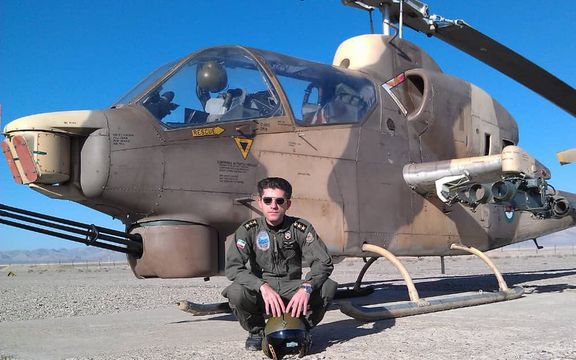
An ex-Iranian military officer has told Iran International TV that Iranian intelligence used a ‘honey trap’ in a plot to render him from Turkey in September.
The former officer was named as Mehrdad Abdarbashi, a major and air-force helicopter pilot who had been living as an asylum-seeker in Van, eastern Turkey.
Speaking to Iran International via video-link Saturday, Abdarbashi said a woman working for Iranian intelligence contacted him pretending she wanted to learn about foreign currency exchange.
Abdarbashi said he always alerted Turkish intelligence when anyone contacted him and they had bugged the woman’s cell phone and discovered her contact with the Iranian security forces. He said he did not know which intelligence body, the intelligence ministry or the Revolutionary Guards intelligence organization, had sent the "swallow,” as Iranians usually refer to women used to entrap men.
Turkish intelligence tapped her cellphone and found out what was going on.
"Her plan was to lure me to the city's outskirts under some pretext so that they could capture me and take me back to Iran, but I did not consent to go,” Abdarbashi told Iran International.“The Turkish intelligence was well aware of everything. They told me to accept her invitation to dinner [on the night of the operation] and promised to protect me so I accepted.”
Turkish intelligence knew, said Abdarbashi, that Iranian agents had given drugs to the woman to lace his dinner so they could remove him from her home when he fell unconscious, pretending they were taking him to a hospital.
Ankara on Thursday revealed that its National Intelligence Organization (MIT) and police had arrested an Iranian − whom they said was an intelligence operative − and seven Turks September 24 over a plot to abduct an ex-Iranian military officer in Van and render him to Iran but did not give the full name of the alleged victim.
Speaking to Turkey's Türkiye newspaper Saturday, Abdarbashi said he had fled Iran and sought asylum after refusing a mission to Syria.
"I am in a safe place now but obviously my life is still in danger after that foiled [abduction] attempt,” he told Iran International, appealing for help from human rights and international organizations.
In 2019 a honey-trap was allegedly used to Ruhollah Zam, who ran a social-media channel on Telegram, to Iraq where he was abducted by Iranian agents. Zam was executed in December 2020 after confessions aired on state television.
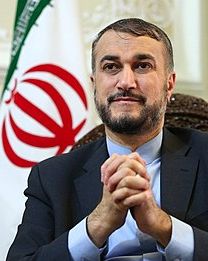
Iran’s foreign minister, Hossein Amir-Abdollahian on Saturday expressed concern over terror attacks and the growth of the Islamic State group in Afghanistan.
In a meeting with Peter Launsky, Secretary-General at the Austrian Federal Ministry for European and International Affairs, Amir-Abdollahian condemned “recent terrorist operations” in Afghanistan and characterized “the growth of the Islamic State and Takfiri groups” in that country as “dangerous”.
Launsky also condemned the attacks and said that Iran and Austria share concerns over the Islamic State group.
ISNA news website in Tehran reported that Launsky visited Iran to hold the fifth round of bilateral political discussions with Amir-Abdollahian, who praised “long-standing” relations with Austria, thanked for Vienna’s donation of Covid vaccines and called for more cooperation against the pandemic.
Launsky also expressed hope that with the participation of all sides the 2015 Iran nuclear deal (JCPOA) can be revived.
Vienna was the venue of multi-lateral talks from April to June aimed at restoring the JCPOA. Iran stopped participating in the talks that have been suspended. Western countries have been urging Tehran to return to negotiations.